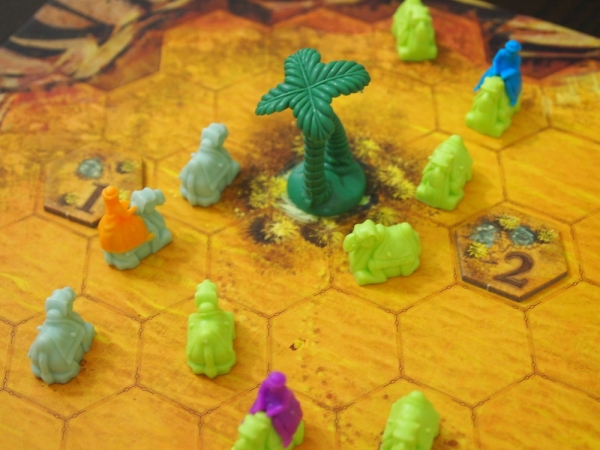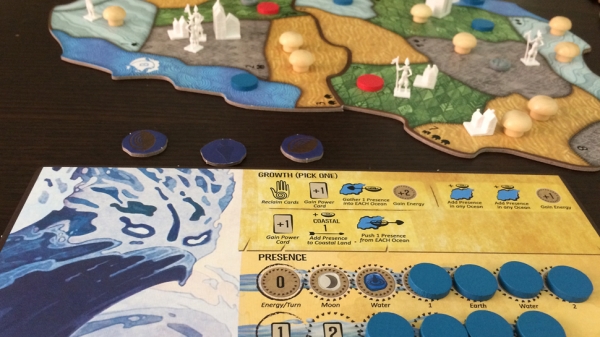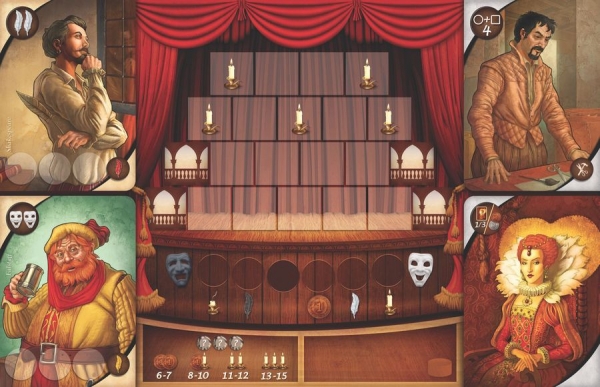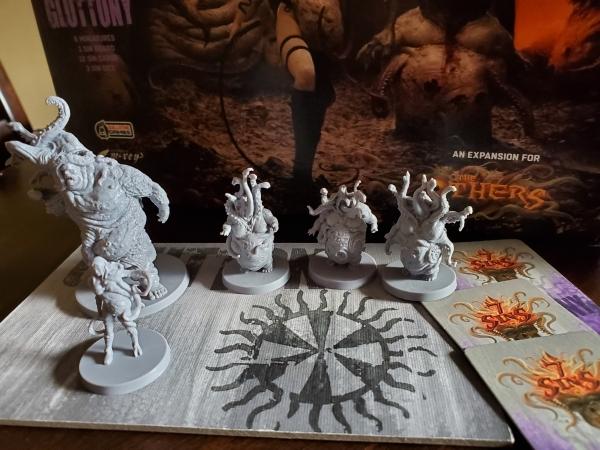Do your favorite games produce a story and does it matter?
What's often lauded as "The Difference" between what are nominally called Eurogames (think Reiner Knizia) and Ameritrash (think Talisman) is the concept of story. The latter tend to tell them, while the former tend not to. What I mean by "story" is that recounting a game to someone else, whether present or not, is often like telling a story. I usually cite Talisman as an example because it's clearly set up to function in that fashion and because I once used a great story of one of my games to convince a friend who was then an RPG-only player to give it a try. He specifically marveled at the fact that "a board game could tell stories like this!", as if it were some incredible possibility. And, to someone raised on games like Sorry! and the oft-maligned Monopoly, it probably was an instance where the idea of getting something more out of a play- and, in fact, something quite close to an RPG experience -just wasn't something he'd ever considered. The story I told him was that I'd gone into a Talisman game with a regular opponent who was determined to beat me (I was mildly infamous in our group for being the regular winner at that particular game.) He had a plan all set up. He started as the Troll, built up his Strength, found the Ancient Artifact, turned it in at the City to become the Archmage, built up his Craft, and then started smashing his way around the board. By that time, two other players had died and given up, while I had died as the Sprite and was on my second hero, the Leprechaun. As he moved to the Portal of Power, I delayed him for a couple turns by casting Hex on it and then asked him why he didn't just come hunt me down and win, especially because I'd done just that in our previous game, by slaughtering everyone with a Runesword-equipped Rogue. He said: "No! I'm going to win the right way!" So, I shrugged and continued to mill around, doing minor things to progress while he ran riot through the top level, and finally picked up the ending card. He then promptly stormed out of the room after falling into the Horrible Black Void, leaving me as the only player left on the board...

You're probably not going to get a story like that out of a play of Through the Desert because TtD just isn't that type of game. Talisman is set up to tell stories like that through rolls of dice, card draws (Drew a Dragon as your first encounter and lost a Life point? Sorry 'bout yer luck!), and other random events that a lot of people don't like. Through the Desert functions with almost perfect information. You're going to win or not win based on your own efforts and the actions of the opposition, not because someone drew the worst possible ending for a game and lost just by a turning over a card when they were clearly the superior character. But moments like that in Talisman are the stories that will last for years (said game happened 28 years ago), whereas I can't tell you what precisely happened in my last game of Through the Desert that took place two months ago (I know I won, but that's about it.) I'll likely never forget that game of Talisman because that's what the game is designed to do. That doesn't mean the game itself is better. Indeed, I don't think there's any comparison, mechanically, between a game like Talisman and a game like TtD. The latter is clearly the better game mechanically, but the two games are set up to provide a different experience. It's like the difference between subtle humor and shock humor. One is enjoyable because it's usually a good insight into a situation. The other is enjoyable because it's a surprise that often flusters or unnerves you. Most have a preference for one or the other, but still enjoy the alternative to a degree. And this also isn't a declarative that non-Ameritrash games can't tell stories.

Think of abstracts like chess or poker. There are lengthy stories that can be told about good chess matches, like in The Queen's Gambit. Similarly, legendary poker games can be the foundation of films like Rounders. Both of those examples work because of the high tension involved in their situations and because those games are often as much about playing the opponent as they are the game itself. This is the root of the Euro fan argument about "skill" being more important in games like Taj Mahal. If you're all playing with the same pieces, then the way you use those pieces is supposed to demonstrate your playing ability in comparison to those playing with you. But that, of course, isn't wholly accurate. Taj Mahal still involves a random card draw and games like Tigris and Euphrates also involve a random draw, just like Talisman. Furthermore, the way you deal with random events or hedge your bets in taking risks in Talisman is every bit the gaming skill that picking the right spot for a palace in Taj is or in knowing how to play your bet in a poker hand. Those, too, are moments of story. They're just less obvious than squaring off with the Demon Lord at the top of the Talisman mountain.

Modern design has followed that path, with more mechanically-sound games that can still evoke those "Remember when...?" moments on a regular basis. Take Champions of Midgard as an example. It's one of the most worker-placementy of worker placement games, but it's also about Vikings fighting mythological creatures. It also involves dice(!), the longstanding black spot of supposed Eurogamers because of their inherently random nature. But, again, just as with Games Workshop games, rolling a fistful of dice means planning beforehand such that even a poor roll will often gain you the result that you wanted, anyway. That, too, is a gaming skill. Also, dice inherently create those moments of story because of the tension and uncertainty that they generate. But even games with almost-perfect information can still create those moments. Our most recent game of Pax Pamir, 2nd Ed. was a good example. Late in the game, a Dominance Check card had emerged in the market, which would've been an ideal get for two players supporting the Russians, as the yellow pieces were everywhere on the board. But a player supporting the British decided to play Prince Akbar Khan, switching his allegiance to the Afghans and changing the favored suit to Military, which doubled the price of that Dominance card, putting it beyond the reach of the Russian players. It was also a huge risk to his own position, since it wiped a couple British cards from his court and put a Persian tribe in a precarious spot. But with the Prince, he later used its two spies and double combat ability to sabotage his opponents and pick up the Dominance card himself for a win with the Afghans. There was no randomness involved. Just smart play.

But even beyond player-created moments, let's think about modern "Euro" games that generate story just based on their setting and characters (like Talisman.) A great example is Spirit Island. Mechanically, it's difficult to consider Spirit Island anything but a "Euro". It's a process game. It has multiple intricate systems that have little to do with randomness (outside of the Event deck and what Minor and Major powers show up in their respective decks.) But it's hard to imagine a game where players are Shadows Flicker Like Flame, Lure of the Deep Wilderness, and Ocean's Hungry Grasp competing with the Hapsburg Monarchy and using powers like Rain of Blood and Gift of Living Energy as anything but a story waiting to be told. Who's going to forget that time when the English had almost overrun the island with cities and Blight before Finder of Paths Unseen used Vengeance of the Dead to claw out a Fear victory at the last minute? Obviously, there's a lot more storytelling texture in a game like Spirit Island than there is in a game like T&E, but in the latter you will always find the back-and-forth struggle over cities and a moment where a properly played Catastrophe that might've prevented the addition of one more point in someone's smallest VP total... Yeah. There are stories there. (It also kind of belies the "pasted on theme" label that tends to follow Knizia around.)

An interesting contrast is a game like Shakespeare. The game, of course, is based on the Bard of Avon, one of the foundation stones to storytelling in the Western tradition. But it's also a fairly intricate engine builder that doesn't create obvious "Aha!" moments that might be considered something to retell at a later date. A lot of the people you employ/activate for your tableau aren't anyone notable other than Set Designer, so you aren't fully in a stylized role as in Spirit Island, although you do have access to many of Bill's famous characters who do different things somewhat based on their roles in the plays. Furthermore, it's a very technical situation, in which you're trying to balance prestige points (VP), money, and action efficiency. All of that can be a story-generating device, but is often more like figuring out a puzzle in the midst of a group of people (aka multiplayer solitaire), which doesn't often lend itself to those memorable moments. Unless Romeo was devastating for you in any particular game, it won't be like referring back to that time you played Calavera, Eagle, and Wengsi Wong versus Gluttony in a game of The Others.

The irony of a game about Shakespeare tending to not produce a storytelling moment is pretty thick. But that game isn't really designed to be that kind of exercise, in the same way that games like Power Grid aren't. In truth, the real generator of stories is often the players themselves. Not every session of any game is going to generate a story. I have most of my plays of Talisman recorded (What characters were played, who won, etc.), but I can look at any number of them and not really recall any specific details about them. That doesn't mean they didn't generate a story. It just means that it wasn't a memorable one. The fact that you can go through a number of plays of Modern Art or Agricola without having their details surge forward in your head the next time you get people together to play doesn't mean that they didn't leave an impression on someone who was at the table. They might not occur to you because you didn't win. But someone did and someone probably remembers.
 Games
Games How to resolve AdBlock issue?
How to resolve AdBlock issue? 
























